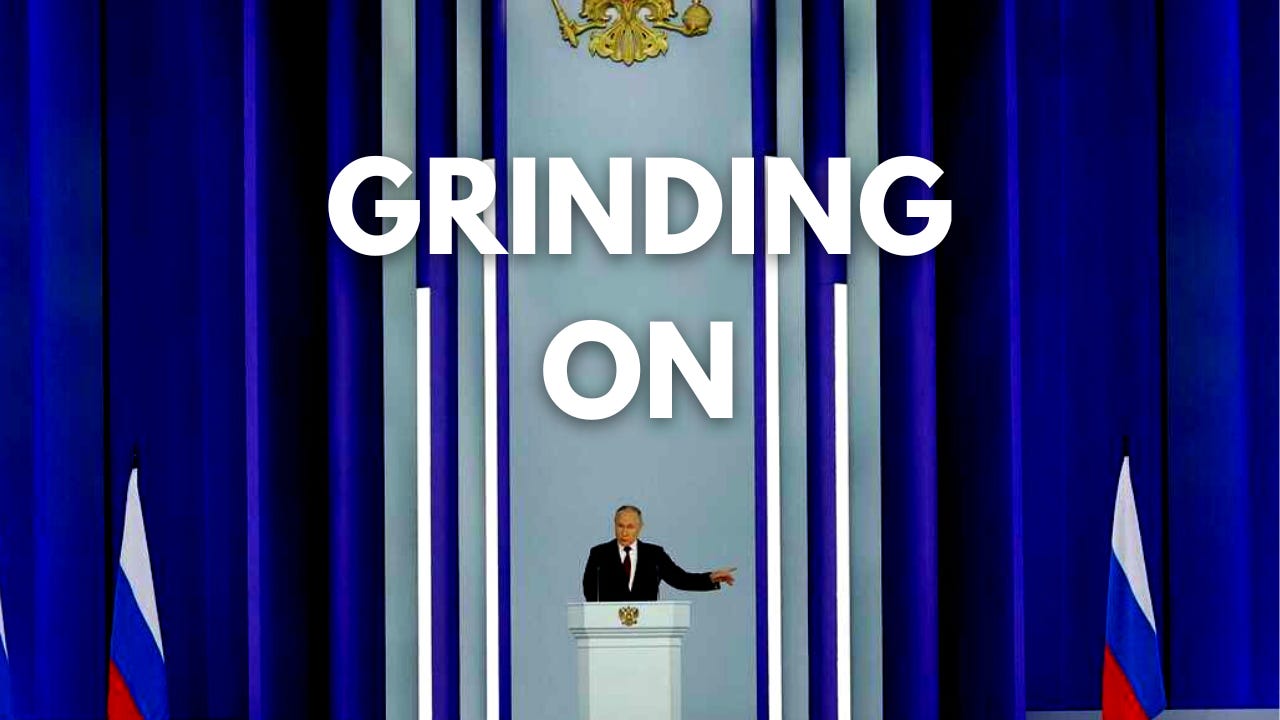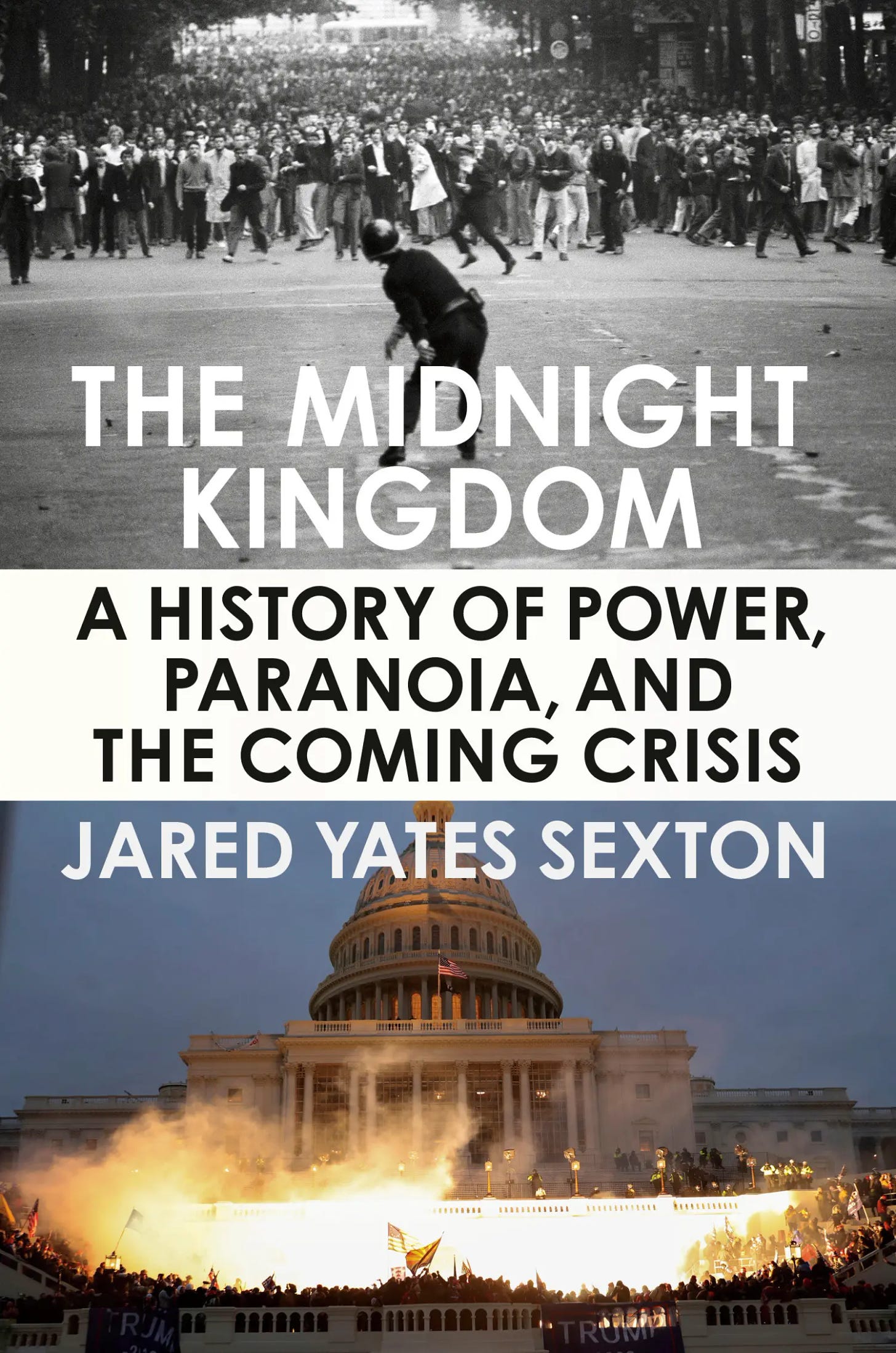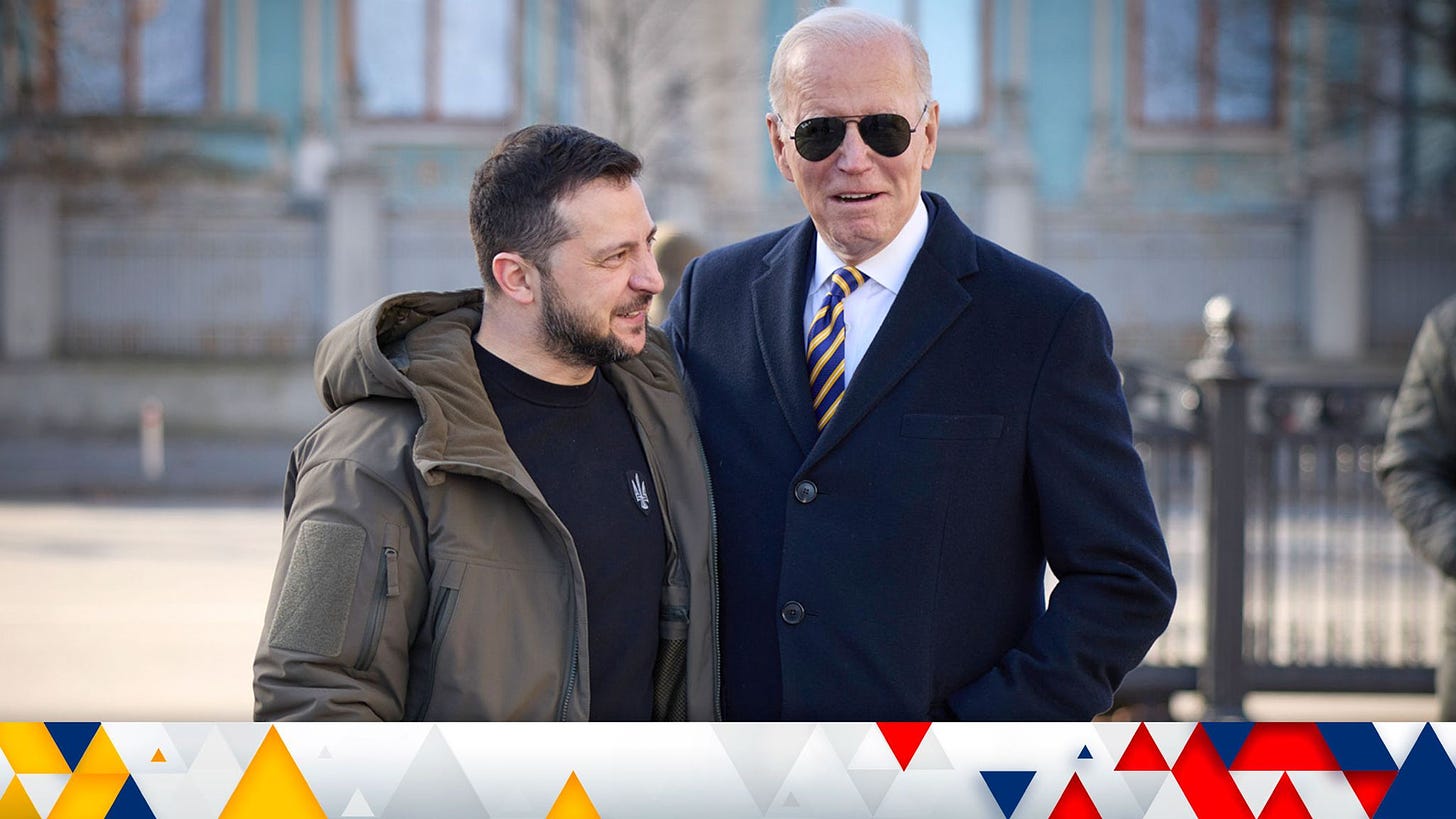Grinding On: One Year of the Ukrainian War
Ukraine has become a meat grinder and the site of an existential battle while allies continue to only gesture at what's really at stake.
DISPATCHES FROM A COLLAPSING STATE needs your support. Subscribe now to keep this project rolling along and growing. Subscribers also gain access to exclusive content, including video Q&A’s, a podcast, and regular articles. If you haven’t subscribed yet, please do. And if you have, consider giving a subscription as a gift to a friend or family member who needs this information.
Reflecting his increasingly isolated existence, Vladimir Putin took the stage at a remarkable distance from his audience Tuesday for his state of the nation speech. In the past year, since Russia invaded Ukraine under his murderous orders, the dictator’s life has been marked by assassination plots, worsening in-fighting inside his inner-circle, and a spate of trusted allies simply falling out of windows.
It is undoubtedly a lonely and miserable life, and to watch him speak is to witness a beleaguered man continue to spout absurdities for his own benefit.
Once more, Putin weaved a story that seeks to justify his crimes against humanity and center himself and the invading forces as liberators and defenders. It is no surprise to hear him once more blame “the West” or liberalism gone mad. It is the same appeals that the Republican Party makes in the United States, that Viktor Orbán and Fidesz makes in Hungary.
“Look at what they do to their own people,” he said, “the destruction of families, of culture and national identities, and the perversion of child abuse, including the normalization of pedophilia.”
If it had been in English it could have been Ron DeSantis, Josh Hawley, Sarah Huckabee Sanders, or any number of Republican leaders.
And there’s a reson for that. Ideologically, Putin and Orbán and a slew of other authoritarians are ideologically aligned with the GOP and any number of other Right Wing parties and groups around the world. This worldview has solidified a partnership and association that spans the globe and threatens liberal democracy in the allies who oppose Putinism wherever it can be found.
The invasion of Ukraine was intended, and continues to be, the launching of an operation to shake the foundations of the global world order and remake it in the image of Putinist Russia and other illiberal hotbeds. The focusing on out-of-control liberalism, the acceptance of gay and trans people, so-called “wokeism,” and the supposed rumblings of “socialism” - whatever that even means now - is merely a means of justifying the aggression and oppression necessary to bring this new order into being.
For the full story of this authoritarian movement, its ideological foundations, goals, and the full extent of this threat, read THE MIDNIGHT KINGDOM: A HISTORY OF POWER, PARANOIA, AND THE COMING CRISIS, which examines the conspiracy theories and machinations of power at play, as well as how we might defeat this authoritarian movement once and for all
What truly matters, and the heart that beats at the center of this conflict and worsening conditions, is that concentrated capital and corruption have grown so out of control that monsters like Putin and the oligarchs he represents have an opportunity to bring the structures of the world down over our heads. They are correct that the order is fragile and vulnerable. The continuing war in Ukraine shows us this is hardly the fait accompli institutionalists have continued to promise us. It is a worsening crisis that, like other crises before it, threatens to expand and escalate until we are looking at a full blown world war.
Or worse.
On that note, Putin announced Russia’s exit from arms treaties, reminding us that the scourge of nuclear weapons, which should have been scrapped and abolished decades ago, still hangs over our head like an anxious guillotine.
These are problems that should have been solved so, so long ago. The fragility of the world order, built in the wake of World War II and the fall of the Soviet Union, was a choice. Instead of demobilizing, creating a better, fairer world, or even hinting at such a thing, we partnered with fascists and Nazis and pursued the agenda of neoliberalism despite all evidence that these avenues would end in self-destruction.
As I said a year ago, none of this was surprising. None of this unpredictable. And none of this was inevitable, if only we had recognized the facts as they existed.
Meanwhile, as the threat grows and the war thunders on, we are still only gesturing at the breadth and scope of the problem. Unsurprisingly, details about Putin’s plan and wide-scale operations have gone largely unexamined as the entire ordeal in the public mind has devolved into easily-digested stereotypes. The association between himself, Orbán, and bodies like the Republican Party only gets spoken about in certain circles, where analysts like myself scream and shout themselves hoarse in hopes that somebody, somewhere will listen and recognize the larger issue at stake.
As suspected, and as predicted, the war was used for a brief time as a ratings bonanza. Viewers turned on cable news to watch the destruction and human tragedy play out in real time, but as is the case with every story of weight and power, the cameras soon turned off and searched for something new. Our economic structure prioritize the next thing and rewards attention spans that only function at the subatomic level, creating, like the disastrous War On Terror, yet another front beyond our senses and beyond our care.
The project of neoliberalism intended this. It focused on creating a world where citizens were separated from democratic powers, from the functioning of the world, leaving technocrats and organizations to the important business of overseeing the system. As a result, we feel largely disconnected, powerless, and increasingly alone, all while the ugliness and suffering marches forward.
President Joe Biden’s trip to Ukraine this week made for great headlines and even better optics, and his speech from the Mariinsky Palace in Kyiv hit some important notes, especially framing the battle itself as a war for democracy.
That is true. Fundamentally, that is exactly what is at stake. But the issue goes far beyond a genocidal dictator with his finger on the trigger.
Putin’s power, and his belief that he could shake the world order, are both born out of his corruption of the Russian state and, by extension, the global order itself. What built this globalism was exploitation and suffering, which dictators like Putin provided for the countries above. His dictatorship was a boon for the West as it took an old rival and turned it into a cog in a larger machine, the same way despots and authoritarians around the world provided cheap labor and readily-available resources. And the money that Putin and his oligarchs accrued as necessary components in this system was then flooded out into the rest of the world through investments and laundering.
The allies that stand in opposition to Putin and the invasion of Ukraine are still filthy with this money and influence. It’s no coincidence that the gathering authoritarian movement involves Russia, China, and a Saudi Arabia that continues to crack down on human rights while flirting with the possibility of joining the other authoritarian nations in an alliance. These are all countries that been used, because of their authoritarian powers, to power the system as a whole. It was only a matter of time until they attempted to unseat the U.S. and the defining order.
But these are not things that Biden or any of the allies can discuss. It’s complicated, for one thing, and requires an extensive knowledge of history and a view of economics that, well, isn’t quite familiar to a lot of people on purpose. And, it’s an indictment of the status quo, which Biden and others have made their fundamental appeal for power. It takes a larger reckoning with how we arrived here, but especially a larger understanding that, in order to avoid what is rumbling down the line, much of the last fifty years would need to be revoked, reordered, and reconsidered.
And so, the war continues on. God knows how many people have died and how many more will die. Every day that it continues is yet another moment where it is clear that the current order is teetering and that something will replace it. Putin’s miscalculations have given us time and space to author something, to put into place structures that might curb this threat and lead us elsewhere, into a world we deserve, but the continued denial of a very obvious reality squanders that time.
It is a hard thing. A hard, hard thing. A tragedy that boggles the mind and troubles the soul until you almost want to look away and embrace this offered existence where we needn’t look at all and just continue to live life as if life itself isn’t changing all around us. But that simply isn’t an option.
We can’t pretend like this is just another day or that the Republican Party isn’t what it is or the international authoritarian movement doesn’t exist or, if it does, isn’t really a threat. We’re too far down the road now and there are simply no signs that this crisis is abating anytime soon.







